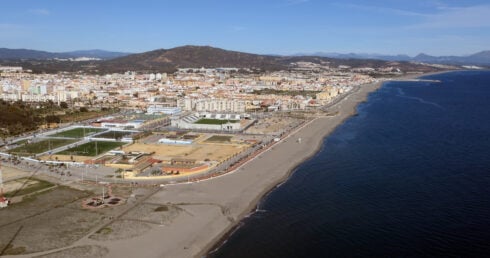WHEN the Spanish authorities decided to enforce spot checks on the border with Gibraltar, most observers thought that the delays would be over by summer.
The common consensus was that this was a political ploy from Madrid to draw attention away from the financial scandals that threaten to engulf Mariano Rajoy’s ruling Partido Popular.
But to the horror of many, the delays have continued and if anything the Spanish have stepped up their actions, the latest tactic being to search the bags of pedestrians, resulting in long queues.
One of the worst of these occurred on evening of December 2, when Spanish authorities decided to search the bags of those leaving Gibraltar, despite the fact that there was a storm blowing.
Women, children and the elderly were forced to queue with no shelter in 50 mph winds and rain and with night approaching.
That there was no flare up of violence speaks volumes of the patience of those who have to cross the frontier every day.
The same tactic was undertaken on Sunday 8 and again on Monday evening, with the wait sometimes lasting up to two hours.
Click here to read more News from The Olive Press.









This sort of thing happens in some third-world countries – little wonder why the Catalans want to sever their links.
Any modern democracy would have realised long ago that the way forward I via debate and reasoning and not by using bully boy tactics.
The smart move here would be equalise the €1.90 Gibraltar price of a packet of cigarettes with the Spanish price of €4.75 and use the difference to pay for a couple of nurses in the Gibraltar cancer hospital.
This would then make it not worth the while for the Spanish unemployed to cross the border in order to smuggle tobacco, thereby reducing the queues and would wrong-foot the Spanish authorities who would not be then able to use long waiting-times at the border as a form of protest.
85% of them are not smuggler’s they have to come in to Gibraltar to work every day because there country cannot provide them with a job, and this is how the Spanish government pays them back, with a 2 to 4 hours queue after working for 8 hours in gib, we Gibraltarians go to Spain if we feel like but they have to come to earn a living, so the Spanish gov is only hurting their own people how sad, they don’t provide you with a job and on top of that they make your life more difficult by trying to hurt the country that is providing you with a living and an hornets job. This is the sad truth and its going on every day.
BritBob
Have you never heard the adage – ‘people in glass houses shouldn’t throw stones’? Does the fact that Scotland, and a sizeable proportion of the people living in Northern Ireland are seeking independence from the UK make the UK a third-world county too or do your biased comments merely serve to illustrate the weakness of your arguments?
Spain, with the full support of the UN, has been seeking to engage the UK in meaningful discussions on the decolonisation of Gibraltar since the early 1960s. It is the UK, not Spain, that steadfastly refuses to come to the negotiation table.
The reality is that the UK has been engaged in duplicitous maneuverings designed to obfuscate on this issue for some time now. Great Britain, compelled to countenance de-colonization by the UN, has sought to retain its colony in Gibraltar by invoking the principle of self-determination in a clearly self-serving way (contrast the UK spin on self-determination with its treatment of the inhabitants of Diego Garcia for comparison).
However, there cannot be self-determination until there is real, rather than pseudo, self-government for Gibraltar. The conundrum for the UK is that to grant real self-government to its colonists in Gibraltar would be a clear breach of Article X of the Treaty of Utrecht which is the only basis on which the UK has any claim to the Spanish territory of Gibraltar.
Spain will continue to pressure both the UK and its colonists until the UK stops playing games and takes meaningful steps to comply with its obligations under international law to decolonise Gibraltar.
Cigarette mules. Earning $3 euros per cigarette pack.
People arbitrage gone bad!
@FurtherBeyond – Gibraltar elects its own government and is more democratic than most places, including Argentina which you bang the drum for all over the internet. Legally the strongest claim to any territory is conquest. That was sorted out in 1704 and the territory has been held since. There is nothing to ‘negotiate’. The people of Gibraltar are British and will remain so because that is what we want, or at least 99.6% of us said reccently. Queues at the frontier only affect Spaniards. It is up to them to take up the problem with their government.
If Spain broke the Treaty of Utrecht twice trying to reconquer Gibraltar why should Gibraltar now go by the rules of Utrecht.
@FurtherBeyond: i just love your comments. They are soooo outrageously wrong, biased, and inflammatory that i actually look forward to them.
If they were just 10% so extreme i’d get angry and correct your ignorance. But as they stand they are hilarious.
Comparing scotland to gib. You might as well compare gib to a painting, or better yet a sandwich – after all the evil british created that as well…
the border problems are totally spains cause.
gib will *never* be spanish.
more crazy ranting please.
FurtherBeyond:
Two differences (of many)
1. The UK is allowing a referendum in Scotland.
2. Any handover of Gibraltar to Spain (decolonisation you call it) would turn the inhabitants into colonial 2nd-class citizens of Spain. More likely would be a Diego Garcia type expulsion.
BigJon
Perhaps you would do better containing your mirth a little and concentrated your limited attention span to actually reading the posts in their context.
At no stage did I compare Scotland to Gibraltar. I was simply responding to Brittbob’s biased and hypocritical post.
The fact that some Catalans may be seeking independence from Spain is as relevant to the decolonisation of Gibraltar as the fact that some Scottish and Northern Ireland people are seeking independence from the United Kingdom.
Go on – do yourself a favour; get off the floor and try reading both posts again, you never know; you may actually learn something.
@CARL
For your enlightenment, prior to the Treaty of Utrecht the status of Gibraltar was that of a territory occupied by allied forces, including Britain, in the name of a claimant to the Spanish throne. That status was only legitimised as a cession to Great Britain once the treaty was signed by the UK and Spain in 1713.
You might also be interested in the current official position of the UK with regards to the potential independence of Gibraltar.
According to the latest UK white paper on Gibraltar ‘…The British Government…supports the principle of right of self-determination, but this must be exercised in accordance with the other principles or rights in the UN Charter as well as other treaty obligations. In Gibraltar’s case, because of the Treaty of Utrecht, this means that Gibraltar could become independent only with Spanish consent’.
@Britbob
It is the UK that is acting like a third world country by continuing to thumb its nose at the UN and failing to honour its treaties and agreements.
It’s not just Spain that does not accept the colony’s legality. The UN has continually listed Gibraltar as a territory that the UK needs to decolonise since the 1960s.
The UN has consistently confirmed that the principle of territorial integrity COMPLEMENTS and CONSTRAINS the right to self-determination in cases such as the British colony of Gibraltar. UN Resolution 1514 (XV) (1960) specifically states that ‘any attempt aimed at the partial or total disruption of the national unity and the territorial integrity of a country is incompatible with the purposes and principles of the Charter of the United Nations.’
The crucial UN decision with reference to Gibraltar was the adoption of UN General Assembly Resolution 2353 in December 1967 which specifically gave primacy to Spain’s claim to the restoration of its territorial integrity over Gibraltar’s claim to the right to self-determination.
UN General Assembly resolutions or decisions on Gibraltar have consistently omitted ANY reference to the Gibraltarians right to self-determination. This position is re-enforced by the United Nation’s consistent call upon Britain and Spain to settle the issue of Gibraltar’s sovereignty through bilateral negotiation that specifically excludes mention of the inhabitants of Gibraltar. Even after the establishment in 2004 of the tripartite Forum of Dialogue, UN decisions continue to refer to the Brussels agreement as the only forum for negotiation. This agreement includes an explicit commitment requiring both Britain and Spain, and ONLY Britain and Spain, to discuss the sovereignty of Gibraltar.
The consistent reference to the Brussels agreement in all decisions and resolutions post 1984 means that the UN supports Spain’s argument that only Britain and Spain can discuss the question of Gibraltar’s sovereignty and that self-determination continues to have no bearing on the status of Gibraltar.
As recently as LAST MONTH the UN Fourth Committee issued a resolution that yet again repeated its previous calls, urging both the UK and Spain to reach a definitive solution over Gibraltar, under the 1984 Brussels Declaration. This agreement expressly excludes any role for the occupants of Gibraltar in determining the sovereignty of Gibraltar. Unfortunately the UK continues to turn a deaf ear to these calls.
@Bill Payer
Spain has been challenging the legality of a British colony on Spanish territory for a very long time. Moreover, it’s not just Spain that does not accept Gibraltar’s legality. The UN has continually listed Gibraltar as a territory that the UK needs to decolonise since the 1960s.
The colony of Gibraltar is ‘a special and particular case’ as far as the UN is concerned for five reasons:
First, although Britain seized Gibraltar in 1704 during the Spanish Wars of Succession and it was awarded in perpetuity to Britain under Article X of the Treaty of Utrecht signed in 1713, Spain has ALWAYS maintained its claim to the restoration of its sovereignty over the territory; it is therefore a UN recognised colony on contested territory and the UN has been constrained to take this into account when considering the decolonization process.
Second, the Treaty contains a reversionary clause providing that if Britain should ever decide to relinquish the sovereignty of Gibraltar, Spain would be entitled to reclaim it before any other option were considered; both Britain and Spain accept that this means ruling out independence for Gibraltar for as long as Spain retains its claim.
Third even if Spain were to remove its claim, the constitutional status of Gibraltar does not meet the standard UN criteria for delisting (either through independence or free association or integration with the former administering power, with the latter having no reserve powers to legislate). The issue of reserve powers is the key sticking point here. This is because the British Governor of Gibraltar continues to exercise power as an administering authority. Gibraltar’s argument that the UN misunderstands the role of the Governor, who acts on behalf of the Queen as Queen of Gibraltar, not on her behalf as Queen of the United Kingdom or on behalf of the UK Government, is not surprisingly, not seen as persuasive by the UN.
Fourth, the isthmus that joins the town and the Rock of Gibraltar to the Iberian Peninsula, and on which the airport has been constructed, is not covered by the Treaty of Utrecht and its sovereignty is therefore the subject of a separate dispute between Britain and Spain.
Fifth, Spain has NEVER recognised UK sovereignty over anything other than the waters of the port of Gibraltar. This is the reason that Spain made the following reservation on signing the UN Convention on the Law of the Sea in 1984:
‘The Spanish Government, upon signing this Convention, declares that this act cannot be interpreted as recognition of any rights or situations relating to the maritime spaces of Gibraltar which are not included in article 10 of the Treaty of Utrecht of 13 July 1713 between the Spanish and British Crowns. The Spanish Government also considers that Resolution III of the Third United Nations Conference on the Law of the Sea is not applicable in the case of the Colony of Gibraltar, which is undergoing a decolonization process in which only the relevant resolutions adopted by the United Nations General Assembly apply’.
Significantly, the European Court of Justice has dismissed two separate challenges by the UK to the establishment of the Spanish administered nature site that covers the entirety of the so called British Gibraltar Territorial Waters.
Oh dear….
“obligations under international law to decolonise Gibraltar”. Yeah, right-o.
“European Court of Justice has dismissed two separate challenges by the UK”…. On a technicality of process, not whether the waters are BGTW or not.
If it was all as simple as you allude, then the UN would tell the UK to pack her bags. It isn’t, they haven’t and we wont.
Furthebeyond – it’s no more a Spanish territory than Portugal is, and never will be (or no more than Ceuta and Melilla are Moroccan, for example). Deal with it.
Any person living in Gibraltar, be they of Spanish origin, UK, European, whatever – no-one in their right mind would have accepted franco’s offer of Spanish nationality (when in reality he would have just gone in and had 90% of them shot) when it was offered, and no-one in their right mind would ever wish to be incorporated into a country now which still proudly lives in its dictatorship past. Not even you, if you were living there.
As britbob said: no wonder the Catalans want out. Maybe you should focus on trying to convince them that remaining part of a corrupt, archaic, francoist dicto-democracy is in their interests instead of trying to rally your own behind a pathetic war cry in Gib. Rajoy tells us he will not allow the Catalan referendum to take place. Well that’s democratic isn’t it? He also says all Spaniards should vote on whether Catalunya should remain Spanish or not. Hmmm I can see the logic, but how ridiculous.
Difference – we allow a vote in Scotland and if they vote to leave, then good luck to them. Perhaps one of the biggest examples of how Spain basks in its dictatorial past is its refusal to even try to understand how this whole democracy thing works.
Further beyond. Gibraltar is recognised by the UN as a British overseas territory. Britain has no lawful authority to transfer the sovereignty of the territory to anyone else without the consent of its people in just the same way as it is applied to every other territory on the decolonisation list. The UN has never said the UK should transfer the territory to Spain. If it wanted to it couldn’t. The UN is quite clear that there are a number of ways to decolonise a territory, one is to let the inhabitants choose to continue to be part of its parent countries territory. The UK has met this requirement but Gibraltar has not been removed from the list of non self governed territories because of corrupt politicians on the UN committee responsible for this.
Yo creo que la forma que tienen los ingleses parásitos de construir su realidad paralela es asombrosa.
Modo irónico “on”:
– Los ingleses siempre son democráticos.
– Los ingleses nunca han sido colonizadores.
– Los ingleses siempre se han ido de sus colonias con el beneplácito de los colonizados (USA por ejemplo je,je).
– Los ingleses nunca se han quedado con lo que han podido tras marcharse de las colonias (Chipre, Atenas, etc.).
– Los ingleses no han asesinado nunca.
– Los ingleses no han robado nunca.
– Los ingleses se comportan como buenos invitados en los países extranjeros donde residen y aprenden su idioma.
– Los ingleses nunca se consideran superiores a los demás.
Sólo os quedáis con islas porque son más fáciles de defender. Pero tranquilos, a Gibraltar le ha llegado su hora.
Y en Gibraltar no quedará una “base de soberanía británica” como en Chipre. El imperio se fue.
Nosotros somos españoles y si esperamos 800 años para recuperar toda la península de los moros podemos esperar lo suficiente para recuperar Gibraltar. El tiempo ha llegado, preparad las maletas.
Los llanitos podrán seguir siendo británicos, no problema, pero el territorio será español. Esa es la diferencia.
FurtheBeyond
Those old UN resolutions from the 1960s were killed off by the UN ICJ when in 1971 and in 1975 they issued advisory opinions which stated,
‘Furthermore, the subsequent development of International Law in regard to non-self-governing territories, as enshrined in the Charter of the United Nations, made the principle of self-development applicable to all of them.’
This is why the UN Fourth Committee has not bothered to mentioned those old resolution since 1974. They are no longer applicable and went against the Article 73 of the UN Charter – Declaration regards non-self-governing territories – which states that ‘the interests of the inhabitants are paramount.’ You can’t have bilateral talks which do not involve the Gibraltarians when the ‘interests of the inhabitants are paramount.’
The danger inherit in the Spanish view -that aliens who have settled on a territory have no right to self-determination, when carried to a logical conclusion will be a basis for driving the people of country, since most of Latin America and the USA, out of places that they now occupy.
Concerning Gibraltar’s territorial waters, the other day Garcia-Margallo, Spanish Foreign Minister expressed doubts on whether Spain would win any challenge over Gibraltar’s waters. In this respect, in 2010, Jose de Yturriaga, former Spanish Ambassador of Iraq, Ireland, Iraq and Russia, said, ‘The Spanish position on the issue of Gibraltar’s waters was weak and lacked any legal basis.’
On the position of the Isthmus, Spain has signed the Helsinki Accord which amongst the ten points:
(III) Recognises the inviolability of frontiers
(VI) Non-intervention on internal affairs
(VII) Recognises equal rights and self-determination of peoples
The final act stated ‘frontiers in Europe should be stable but change by peaceful internal means and by AGREEMENT.
The Isthmus was originally a ‘neutral zone.’ The southern part is now British Gibraltarian by virtue of ‘prescription’ and Spain justifies occupation of the northern part.
Dos palabras
Ceuta
Melilla
Territorio marroquí
Touche mes amigos
Furthebeyond
UN ICJ Judgement – Maritime Delimitation Case – Gulf of Maine Area Canada -v-USA 12 October 1984
Paragraph 83 ‘No maritime delimitation between states with opposite or adjacent coasts may be effected unilaterally by one of those states. Such delimitation must be sought and effected by means of agreement.’
UN ICJ Judgement- Maritime Delimitation Black Sea Romania -v- Ukraine 3 February
Paragraph 33 ‘The court will therefore apply the relevant provisions of UNCLOS as interpreted in its jurisprudence, in accordance with Article 31 of the Vienna Convention the Law of Treaty of 23rd May 1969. Romania’s declaration as such has no bearing on the Court’s interpretation.’
(Romania had made declarations under Article 310 of UNCLOS regarding fishing, uninhabited islands and security interests)
Hola meparto
Desde qué país provienen de Los Conquistadores?
Tenemos un dicho en Inglaterra
Los que viven en casas de cristal no debería arrojar piedras
Quatro palabras
Ceuta
Melilla
Islas Canarias
Territorio marroquí
Touche mis amigos
Jon,
There is no obligation on behalf of the British Government WHATSOEVER to return Gibraltar to Spain if Spain hands over Cueta and Melilla to Morocco. The people who are constantly putting “The Cueta and Melilla solution” as an answer to the Gibraltar problem are merely mudding the waters.
Any international lawyer you would seek an opinion from will tell you that a treaty signed in 1713 cannot seriously be used to restrict or curtail the rights of people to determine their own future.
Here’s what the ICJ says about territorial claims: From Legal Issues Involved in Western Sahara Dispute – the Principles of Self-Determination – Committee on the UN 2012 – New York City Bar Association
Paragraph 58
‘To summarize, according to the ICJ, a state’s right under International Law to acquire the territory of another sovereign state or non-self-governing territory, against the will of the people under the theory of ‘historical ties’ is severely circumscribed, the theory cannot support the annexation of the territory of another state. WHEN APPLIED TO THE A NON-SELF-GOVERNING TERRITORY THE REQUIREMENTS ARE STRICT; IT REQUIRES PROOF OF CONTINUOUS, IMPORTANT AND FORMAL TIES OF A POLITICAL AND ECONOMIC NATURE WHERE IT HAS SUCCESSFULLY DEFEATED THE RIGHT OF THE INHABITANTS TO SELF-DETERMINATION.’
I am a british and proud gibraltarian there been many interesting comments said here in particular one that says that spain will wait 800 years for gibraltar well luckily spain does not have to wait that long for our answer the one that has been said to you for 308 years on yer bike son british we were born and british we will die
meparto: It’s an English-speaking paper and English-speaking forum. However, como un buen andalú you clearly have no idea (or indeed necessity) to speak our language. Although you do use English words to appear cool, or street as so many do round here (often incorrectly).
Now that is irony.
BritBob, you have put it as it is, say no more. PUNTO PELOTA!!.
@BritBob
You might like to enlighten the international lawyers working for the UK Foreign Office about your learned views that ‘..any international lawyer you would seek an opinion from will tell you that a treaty signed in 1713 cannot seriously be used to restrict or curtail the rights of people to determine their own future’.
You might be interested to learn that according to the latest UK white paper on Gibraltar ‘…The British Government…supports the principle of right of self-determination, but this must be exercised in accordance with the other principles or rights in the UN Charter as well as other treaty obligations. In Gibraltar’s case, because of the Treaty of Utrecht, this means that Gibraltar could become independent only with Spanish consent’.
I’m sure they would be thrilled to learn that they are mistaken about the application of the Treaty of Utrecht to Gibraltar.
The reality is that the UK has been engaged in duplicitous double-speak designed to obfuscate on this issue for some time now. Great Britain, compelled to countenance de-colonization by the UN, has sought to retain its colony in Gibraltar by invoking the principle of self-determination in a clearly self-serving way (contrast the UK spin on the application of the principle of self-determination in the case of Gibraltar with its treatment of the inhabitants of Diego Garcia for comparison).
The UK Foreign Office knows full well that there cannot be self-determination until there is real, rather than pseudo, self-government for Gibraltar. The conundrum for the UK is that to grant real self-government to its colonists in Gibraltar would be a clear breach of Article X of the Treaty of Utrecht which is the only basis on which the UK has any claim to the Spanish territory of Gibraltar.
Spain will continue to pressure both the UK and its colonists until the UK stops playing games and takes meaningful steps to comply with its obligations under international law to decolonise Gibraltar.
@BritBob
Your lay musings on international law are not well funded I’m afraid. Under international law the right to self-determination does not apply to transplanted populations illegally occupying another nation’s territory. A coloniser cannot legally disrupt the territorial integrity of another State by implanting its own population unto the territory it is colonising.
This is the case with the British colony of Gibraltar. In such cases, the occupants of the territory have a right to have their ‘interests’ considered but they have no right to unilaterally determine the nationality of the territory they occupy.
This exception to the right of self-determination has been confirmed by the International Court of Justice as recently as 2004 when it ruled that ‘…under the terms of Article 49, paragraph 6, of the Fourth Geneva Convention … an Occupying Power shall not deport or transfer parts of its own civilian population into the territory it occupies. … Such policy and practices “have no legal validity” and constitute a “flagrant violation” of the Convention and are in breach of international law.’ (see International Court of Justice Advisory Opinion of 9 July 2004).
If you’re interested in the facts on the application of the right of self-determination to colonial situations then you should do yourself a favour and have a look at what real international lawyers have to say on this issue. For example, have a look at the following reference by an eminent British international lawyer, and Cambridge University Professor: James Crawford, The Creation of States in International Law (Oxford: Clarendon Press, 1979) at 377-85 where he states unequivocally that there are ‘… exceptions to the primacy of self-determination in the colonial context in the cases of ‘plantations’ (ie territories “predominantly populated by citizens or subjects of the colonial power who settled in the colonial territories”), colonial enclaves, and pre-emptive rights under treaties and leases. Gibraltar is an exception for all three reasons’.
@BritBob
Your assertion that ‘…Those old UN resolutions from the 1960s were killed off by the UN’ is not correct I’m afraid.
All UN General Assembly resolutions or decisions on Gibraltar have consistently omitted ANY reference to the Gibraltarians right to self-determination. This position is re-enforced by the United Nation’s consistent call upon Britain and Spain to settle the issue of Gibraltar’s sovereignty through bilateral negotiation that specifically excludes mention of the inhabitants of Gibraltar. Even after the establishment in 2004 of the tripartite Forum of Dialogue, UN decisions continue to refer to the Brussels agreement as the only forum for negotiation. This agreement includes an explicit commitment requiring both Britain and Spain, and ONLY Britain and Spain, to discuss the sovereignty of Gibraltar.
The continued and consistent reference to the Brussels agreement in all decisions and resolutions post 1984 means that the UN supports Spain’s argument that only Britain and Spain can discuss the question of Gibraltar’s sovereignty and that self-determination continues to have no bearing on the status of Gibraltar.
As recently as October 2013 the UN Fourth Committee issued a resolution that yet again repeated its previous calls, urging both the UK and Spain to reach a definitive solution over Gibraltar, under the 1984 Brussels Declaration which expressly excludes ANY role for the occupants of Gibraltar in determining the sovereignty of Gibraltar.
All these laws, do you think the people of Gib would be better off under a Spanish Government? I don’t suppose anyone is worried about that in Spain, they would just love to wreck the place like their Country.
The old resolutions on Gibraltar were killed off when the UN ICJ advised in 1971 and repeated in 1975, that ALL non-self-governing territories had the right to self-determination. Those resolutions also went against the principles of the UN Charter – Article 73 that states, ‘the interest of the inhabitants are paramount.’
The Brussels agreement is also dead in the water as you cannot have the UK and Spain discussing Gibraltar without the Gibraltarians who DO have the right to determine their own future.
The Gibraltarians can quite easily change their constitution just like the Irish did. All they would have to do is insert the words ‘if applicable under current international law’ after any Utrecht clause and put it to their electorate – easily done.
The Spanish denial of self-determination because of territorial integrity is ‘pathetically weak’ and only convinces the gullible. The problem inherited in the Spanish view that aliens who have settled in Gibraltar have no right to self-determination set a dangerous precedent as when carried out to a logical conclusion would be a basis for driving the people of a country, specifically most of Latin America and the USA, out of places that they now occupy.
Llívia is a town of the province of Girona, Catalonia, Spain. It is a Spanish exclave within the French département of Pyrénées-Orientales.it is seperated from Spains border by a corridor a mile wide. It has bee Spanish since the 16th century. Why is this different to the Gibralter situation? Why are we discussing resolutions that have been decided in the capital city of a country that (the founder member of the EU) that has only became a country 181 years ago way after Gibralter became British. These are only a couple of examples. Why not leave things as they are? Sort out the border issues and let people both sides of the border get on with their lives. After all whose life is going to improve for the better if the Spanish have their way???
It’s not about sovereignty. It’s about the Gibraltar Town Council laying claim to long disputed waters between Britain and Spain by dumping concrete blocks into them.
Just last week a Gibraltar newspaper published “evidence” from the International Maritime Organization – a part of the UN, showing that part of the port of La Linea has been built within the Gibraltar boundaries; so you can fully appreciate the Spanish having to put their foot down before Valencia disappears into British Gibraltar Territorial Waters.
Wait till Catalonia votes itself out of Spain, then allow Gibraltar in to make up for the loss…
(After all, English would then become another official language of Spain, and a rather useful one at that!)
Thanks for every other informative web site. Where else could I get that kind of information written in such an ideal method? I have a undertaking that I am just now running on, and I’ve been on the glance out for such info.